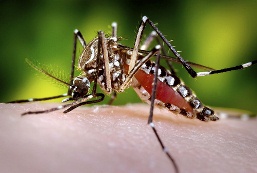
Co-authored with Dr. Ciro de Quadros
The world is anxious for a dengue vaccine. It is estimated that 40 percent of the global population is at risk, and in too many countries, dengue fever is common and frequently causes outbreaks. When it hits, the effects on families and communities include pain, economic hardship and fear of whether tomorrow will bring a fatal or serious illness to a household member.
Today The Lancet released the first ever results from a dengue vaccine trial with enough cases to measure the vaccine's effectiveness. The trial's results provide signals rather than definitive answers, and a mixture of both promise and unresolved challenges. To date, these represent the most promising indications that a safe, effective vaccine to prevent dengue is technically feasible. At the same time, the results on protection were inconclusive, somewhat inconsistent with the measured immune responses and uneven across the four strains included in the vaccine. Fortunately, a much larger trial already underway in 10 different countries is likely to tell us by 2014 if the signals observed in this trial are accurate or not.
 Image Credit: Sabin Vaccine Institute
Image Credit: Sabin Vaccine Institute
This phase 2b randomized, controlled trial, which was conducted in one dengue-affected area of Thailand called Ratchaburi, allowed the investigators to measure the vaccine's safety and protective effects. The signal on safety was very promising. There were no significant safety concerns identified in this trial. Larger trials with longer follow up of people will be required to further establish the safety of these vaccines, but the absence of safety concerns in a group of approximately 4,000 participants is encouraging.
The mixed signals come in the area of protective efficacy. To understand the results, you need to remember that dengue is not caused by a single virus, but rather by four different related viruses, known as DENV 1, 2, 3, and 4, and that the vaccine in this trial is designed to protect against all four. This is where the results are mixed and largely inconclusive. On the one hand, there was no overall reduction in dengue cases observed from the use of the vaccine. On the other hand, in sub-analyses of the overall study, there were indications of protective efficacy versus three of the four serotypes (DENV 1, 3, and 4). The disappointing signal was in the fact that no protection was observed versus infections with the DENV 2 virus, which was the most common serotype in this community (and hence, no overall protection was observed when the effects of all 4 were combined). This lack of observed protection vs. DENV 2 was also surprising, given that the vaccine appeared to stimulate good immune responses among those who received it. Deeper analyses of these results are needed to determine what might explain this observation, and more importantly, what might be done to overcome it.
It will be important to see the results of the larger trial and the effectiveness of the vaccine in different epidemiological settings. These results may mirror what we have seen in Thailand, but we could also see stronger results and demonstrably good protection in these larger trials. It's just impossible at this point to predict. We at the Dengue Vaccine Initiative (DVI) will continue to follow the progress of Sanofi's vaccine as we work to lay the foundations for the adoption and rollout of a licensed dengue vaccine in the future.
Vaccine research requires focus, creativity, tremendous dedication and multi-disciplinary teams. Success is never guaranteed, and many great ideas for vaccine candidates fail to become successful public health vaccines. For these reasons, the research teams in Thailand and at Sanofi deserve recognition for their tireless efforts to advance the dengue vaccine. We are grateful for the efforts to date, and eager to see what results come out of the next, larger phase 3 trial. In the meantime, the dengue virus better look out. A safe, effective vaccine might be right on its tail and about to overtake it.
Dr. Orin Levine is the Executive Director of the International Vaccine Access Center at Johns Hopkins Bloomberg School of Public Health. Dr. Ciro de Quadros is Executive Vice President of the Sabin Vaccine Institute. Both organizations are members of the Dengue Vaccine Initiative.
